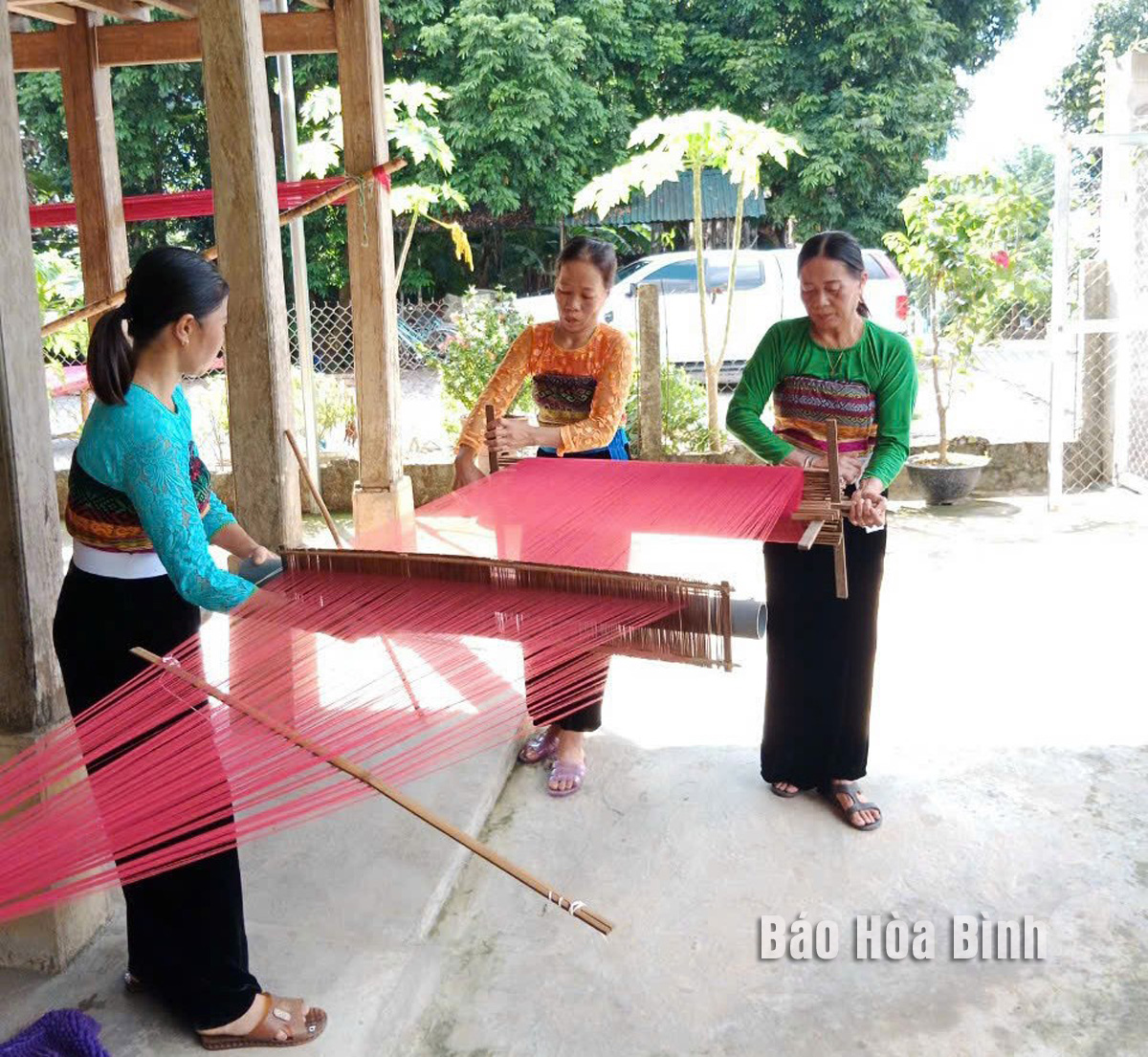
The preservation and promotion of traditional handicrafts of ethnic minority communities in Hoa Binh province plays a crucial role, as it not only creates jobs and increases income for locals, but also helps preserve ethnic cultural heritage.

Chieng Chau brocade weaving and tourism service
cooperative, Chieng Chau Commune (Mai Chau), creates jobs for ethnic minority
women.
To revive the traditional weaving craft of the Thai ethnic
group in Mai Chau district, with the support and collaboration of the Japan
International Cooperation Agency (JICA), the Chieng Chau brocade weaving and
tourism service cooperative was established in 2009. Since then, the
cooperative has engaged in many creative and practical activities to preserve
and develop the traditional weaving craft of the Thai people.
Vi Thi Oanh, deputy director of the cooperative, said that
in recent years, cooperative members and local weaving households have
continuously explored, innovated, and improved designs to enhance product
quality, meet market demands, and cater to tourists. Its products have reached
various regions across the country and even attracted orders from abroad. The
cooperative has also contributed to improving livelihoods for dozens of ethnic
minority women in the locality, providing them with stable incomes.
Currently, Hoa Binh has 11 craft villages recognised by the
provincial People's Committee. Local authorities are focusing on reorganising
these trade villages in accordance with legal regulations on planning, land
use, and construction so as to ensure sufficient space for production, preserve
the landscape, and integrate environmental protection with rural development.
Efforts are also being made to build criteria, and assess and classify the
activities of these craft villages in alignment with sustainable development
goals, while building and digitising a database system, and developing craft
villages that produce products with high economic values, high cultural content
and significant export potential.
Through various measures, craft villages in the province
have gradually been revived and developed, contributing to the preservation and
promotion of the unique cultural values of local communities. Notable crafts
include beekeeping, traditional weaving, bamboo and rattan weaving, stone and
driftwood carving, ethnic cuisine, and processing of agricultural, forestry,
and aquatic products. To date, the province has five craft villages with
recognised OCOP (One Commune One Product) products and two with registered
trademarks. Trade villages are offering jobs for 1,300 people, with an average
income of 3-5 million VND (120-200 USD) per person per month.
With an increasingly vibrant and widespread emulation movement aimed at building cultured residential areas and cultured families, Yen Thuy District has been making steady progress toward improving both the material and spiritual well-being of its people, while fostering a civilized, prosperous, beautiful, and progressive community.
Once lacking recreational spaces and community facilities, Residential Group 2 in Quynh Lam Ward (Hoa Binh City) has recently received attention for the construction of a new, spacious, and fully equipped cultural house. The project followed the model of state support combined with public contributions in both labor and funding.
The "All people unite to build cultural life" movement, which has been effectively integrated with Kim Boi district’s socio-economic development goals, is fostering a lively spirit of emulation across local residential areas, hamlets, villages, public agencies, and enterprises. In addition, through the initiative, traditional cultural values are being preserved and promoted, while community solidarity and mutual support in poverty reduction and economic development are being strengthened.
A working delegation of the Hoa Binh provincial People’s Committee led by its Permanent Vice Chairman Nguyen Van Toan on June 11 inspected the progress of a project to build the Mo Muong Cultural Heritage Conservation Space linked to tourism services in Hop Phong commune, Cao Phong district.
Born and growing in the heroic land of Muong Dong, Dinh Thi Kieu Dung, a resident in Bo town of Kim Boi district, in her childhood was nurtured by the sweet lullabies of her grandmother and mother. These melodies deeply imprinted on her soul, becoming an inseparable part of her love for her ethnic group's culture. For over 20 years, this love for her hometown has driven Dung to research, collect, and pass down the cultural values of the Muong people to future generations.
In the final days of May, the Ethnic Art Troupe of Hoa Binh Province organized performances to serve the people in remote, mountainous, and particularly disadvantaged areas within the province. These were not just ordinary artistic shows, but they were the meaningful journeys aimed at spreading cultural values, enhancing the spiritual life of the people and contributing to the preservation of ethnic minority cultural identities.



